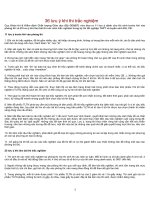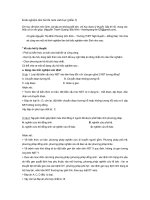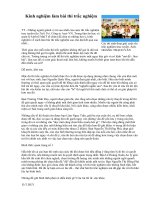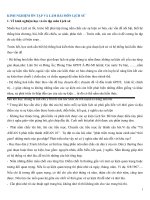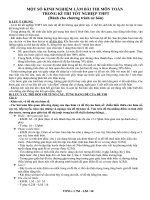IELTS experience ( Kinh nghiệm làm bài thi IELTS )
Bạn đang xem bản rút gọn của tài liệu. Xem và tải ngay bản đầy đủ của tài liệu tại đây (43.91 KB, 9 trang )
IELTS analysis "Cambridge series"
Reading the wrong title because of
Often students asked: "Teacher, Cambridge series of books in question had done what
can be done?" I will ask one question: "Are you of only the finished, or the topics are
analyzed finished?" Get the answer is usually is the former. Chinese students are very
hardworking, like to engage in problem sea tactics, from a large number of the title theme
to do to improve their confidence, but not good analyzed and summarized. Many students
finish the answer, even if the title of the End of the article is over, are often not very clear
where she had been wrong. I often tell students that, at the wrong time to review those
questions will never be more than the right value to those questions. If the name on the
short-plate theory, the subject of those who had done something wrong is our short-board,
if there is no time to analyze the reasons, to the time when the real test may also make
mistakes in the same place. Therefore, we in Cambridge in the series of articles is
completed must be the subject of their own mistakes (including the Mongolian luck on
the topic) for analysis and conclusion on the causes, it is a good target to overcome.
According to feedback from students, I put you usually read the title wrong in the cause
of IELTS subtotals, and give some solutions.
1, positioning error
Most of the reading are the details of the subject title, mainly to study the details we have
a search capability, saying that white is the "find", the subject can not make a lot of
students come to the main reason could not find. Generally can not be found for two
reasons:
(1) did not chose the right keywords
Keywords are mainly used for positioning, their selection is very important, as we did not
choose the right hard to find the problem. To determine questions such as saying goes "In
1985, AI was at its lowest point." (Sword 5Test3Passage3Q33) a lot of students want to
get to the AI or the lowest position, but the title of this article is called "The Return of
Artificial Intelligence", AI is the article, keywords, everywhere, no way to locate a point;
In addition, the judge questions may be wrong, wrong for the problem asks the most
likely place is the lowest, if this question is wrong, is not with the lowest France location.
Therefore, we try to choose a special and irreplaceable information as keywords to locate.
(2) The key words synonymous substitutions do not know or did not pay attention
Some of the questions of the key words in the text will be synonymous substitutions.
Sometimes we can find right keywords, but replace the words may not know or did not
notice. For example the keyword in the title of a Road "protect" appears in the
replacement of the original word "conservation", to replace the word if you do not know
this, it is possible to find the problem. Or sometimes because of lack of concentration but
did not notice keywords replace. For instance Sword 4 Ethics in title to a "1900" This
year, the synonymous substitutions in the original text is "twentieth century". Many
students see the "twentieth century" at once the reaction is from 2000, did not realize was
in 1900, so this question may also be missed. Therefore, the normal accumulation of
words, as well as examination focus is very important.
2, positioning of the title wrong
If you target the right and the subject is still wrong in general have the following reasons:
(1) words
The word is a worry to many students a question, a considerable number of students
unable to do anything to the subject are due to insufficient vocabulary. Once a student to
ask the meaning of a word, I looked very much a collapse of the "population". Therefore,
the IELTS test prior to the accumulation of vocabulary is necessary, the core vocabulary
of at least four universities were available.
(2) ideas
If the positioning is correct, there is no problem understanding the word, while the
subject is still not done right, it is generally thought problem. Questions such as FALSE,
and NOT GIVEN to determine the difference between multiple-choice questions to push
too far ... ... This requires a concrete analysis of specific kinds of questions, focusing on
easy to find the wrong kinds of questions for each place, we must sum up their own
thinking to do problems .
(3) non-mainstream Error
Is also the subject of some students is very wrong somehow, which should not be wrong,
but wrong. For example the sword 5 in the corresponding article in the title proper way
"battlefield (battlefield)" This word, resulting in students to see into "butterflies
(butterfly)", then the subject was unable to make out. This is mainly examinations too
nervous or can not concentrate and are therefore a good test to adjust their mental state is
critical.
The above is subject students normally may be wrong some of the reasons, therefore, we
finished Cambridge series of questions must be done after the wrong problem analysis,
the subject is not more in the fine.
IELTS Reading the necessity of attention
to new topics
Remarks at the candidatesIELTSRead the exam, they often stress that we
will go to the classic old topic importance. However, in today's become the trend
of this era of reform and innovation environment, the candidates in order to
achieve a satisfactory result, only to be concerned with an old topic can not
guarantee that the candidates have obtained satisfactory results of their own. In
this article, Longre overseas research center's teacher will speak on the need to
focus on new topics as well as conventional forms of new topics to make an
analysis in order to help candidates better understand the IELTS reading test a
new topic.
Concerned about the need for a new topic
Although some of the "old story" is still repeated in the IELTS exam, but the
constant introduction of new topics is IELTS inevitable choice.
First of all, reduce the number of old topic, new topic in large numbers.
IELTS reading exam in 2005 before the background of little change in the article,
variety is not very rich, old topic visits accounted for a larger proportion of the
article. Only full-year 2005 study of IELTS 6 into the above topics, there is an old
topic of the background. However, since 2005, the new theme of the frequency
has gradually accelerated. To 2008 when the old topic in the IELTS test in the
proportion of the year dropped to about two into the new topics are springing up
in almost every general examination of them. There were even some screening
examination three articles are a new topic. Such as the 2008's January 10, June
14, July 26 and so on.
Secondly, the topic of ultra-high frequency appears reduced. Prior to 2005,
read the article background repetition rate relatively high. Take 2004 for example
the topic. "Seabed exploration ship", "Butterfly Farm", "notes development", "coin
development" and other topics appeared two times; "Protection of Forests in
Europe" appears three times; "Language Change", "health care", "school
violence" , "athlete", "Australia's treatment," and so subject have emerged four
times or more. In 2005 "campaign with the British adolescent health" appears
three times, and in 2004 there have been "submarine exploration ship" in 2005
also appeared 3 times. As time goes on, since 2006 onwards, although it will still
appear such as "Notes development" like the old topic, but these old topic rarely
the same as a lot of times before. Kind of like a 2004's four times has been
almost impossible to be there. Of course, some of the ultra-high frequency prior
to the emergence of the subject chosen because of its typical and Cambridge
series has become an example of IELTS candidates for the general study of the
structure and wording of the topic and the angle of the.
From the above two points can be clearly seen on the one hand the number
of IELTS old topic in a serious reduction in the candidates the chance to see the
old topic in the reduced; the other hand, even if there is a old topic, this topic
throughout the year in the emergence of frequency can not be too high, basically
in two or less. Therefore, IELTS pace of new problems emerging is firm and can
not be stopped.
Common topic in the form of a new
As a mature language proficiency testing system, the new topic IELTS
course, not completely without rules to follow, in this, overseas examination
Longre Research Center, the teacher will expand the type and extension of new
wine in old bottle common type of these two categories characteristics of the new
topic form analysis and pointed out that the candidates respond to these two
types of the new topic approach.
Expansion-type epitaxial
This new question is the core content of the reservation on the basis of the
original to make a new extension. In general, the adjustment is not too large, that
is, on the basis of existing knowledge to add some relevant information. Energysaving environmental protection, new energy development topics, for example. In
the December 8, 2007 appeared an article in the British tidal power generation,
the main point of content is made to explain tidal devices and relevant content.
However, in the September 27, 2008, when re-examine this element, then based
on "Ocean power generation" forms, introduced the four main methods of marine
power generation methods. In this way requires candidates to master the content
of tidal power generation, while other types of marine power generation have
also been know to deal with related articles.
The following is taken from the "Viking encyclopedia" on the tidal power and
ocean thermal energy power generation some background knowledge,
Tidal power, Sometimes called tidal energy, is a form of hydropower that
converts the energy of tides into electricity or other useful forms of power.
Although not yet widely used, tidal power has potential for future electricity
generation. Tides are more predictable than wind energy and solar power.
Historically, tide mills have been used, both in Europe and on the Atlantic coast
of North America. The earliest occurrences date from the Middle Ages, or even
from Roman times.
Tidal power can be classified into three main types:
Tidal stream systems make use of the kinetic energy of moving water to
power turbines, in a similar way to windmills that use moving air. This method is
gaining in popularity because of the lower cost and lower ecological impact
compared to barrages.The largest tidal energy is the bay of Fundy
Barrages make use of the potential energy in the difference in height (or
head) between high and low tides. Barrages are essentially dams across the full
width of a tidal estuary, and suffer from very high civil infrastructure costs, a
worldwide shortage of viable sites , and environmental issues.
Tidal lagoons, are similar to barrages, but can be constructed as self
contained structures, not fully across an estuary, and are claimed to incur much
lower cost and impact overall. Furthermore they can be configured to generate
continuously which is not the case with barrages .
Ocean thermal energy conversion (OTEC or OTE) is hydro energy
conversion system which uses the temperature difference that exists between
deep and shallow waters to run a heat engine. As with any heat engine, the
greatest efficiency and power is produced with the largest temperature difference.
This temperature difference generally increases with decreasing latitude , ie near
the equator, in the tropics. Historically, the main technical challenge of OTEC
was to generate significant amounts of power, efficiently, from this very small
temperature ratio. Changes in efficiency of heat exchange in modern designs
allow performance approaching the theoretical maximum efficiency.
The Earth's oceans are continually heated by the sun and cover nearly 70%
of the Earth's surface; this temperature difference contains a vast amount of solar
energy which can potentially be harnessed for human use. If this extraction could
be made cost effective on a large scale , it could provide a source of renewable
energy needed to deal with energy shortages, and other energy problems. The
total energy available is one or two orders of magnitude higher than other ocean
energy options such as wave power, but the small magnitude of the temperature
difference makes energy extraction comparatively difficult and expensive, due to
low thermal efficiency. Earlier OTEC systems had an overall efficiency of only 1
to 3% (the theoretical maximum efficiency lies between 6 and 7%). Current
designs under review will operate closer to the theoretical maximum efficiency.
The energy carrier, seawater, is free, although it has an access cost associated
with the pumping materials and pump energy costs. Although an OTEC plant
operates at a low overall efficiency, it can be configured to operate continuously
as a Base load power generation system. Any thorough Cost-benefit analysis
should include these factors to provide an accurate assessment of performance,
efficiency, operational and construction costs and returns on investment.
The concept of a heat engine is very common in thermodynamics
engineering, and much of the energy used by humans passes through a heat
engine. A heat engine is a thermodynamic device placed between a high
temperature reservoir and a low temperature reservoir. As heat flows from one to
the other, the engine converts some of the heat energy to work energy. This
principle is used in steam turbines and internal combustion engines, while
refrigerators reverse the direction of flow of both the heat and work energy.
Rather than using heat energy from the burning of fuel, OTEC power draws on
temperature differences caused by the sun's warming of the ocean surface.
The only heat cycle suitable for OTEC, is the Rankine cycle, using a lowpressure turbine. Systems may be either closed-cycle or open-cycle. Closedcycle engines use working fluids that are typically thought of as refrigerants such
as ammonia or R-134a. Open-cycle engines use the water heat source as the
working fluid.
Candidates in the pro forma process should focus on a core content as
much as possible to understand the relevant extension information, so as to
ensure that when the examination of such new problems encountered can also
be its capability.
New wine in old bottle-type
This new topic is rather confusing, often difficult to identify the candidates
would be mistaken to classify them as an old topic category. But in fact this topic
just as new wine in old bottles, like the bottle on the surface, is really the content
has long been a variety of. We Take the ants, the IELTS biological category "star
animals", for example. It is the article in the IELTS reading test were very high
frequency of occurrence. Candidates in the pro forma additional background
knowledge in the course of time if only a superficial look, the article is about the
ants, then surely the same content, without careful study of the. Is not true.
Examine each of the exam will be found that, although ants are about, but the
various articles and content point of view expounded is a great different. Either
describes how ants feeding and digestion, and some ability to introduce farming
ants, some introduced ants queue, and some talk about the benefits of ants for
fruit trees, of course, from a human point of view on how to catch ants. August 8,
2009 examined "The ants of income transfer", mainly related to ants how to
transmit information between each other. The article also includes how to
educate future generations on a variety of ants, including the exchanges between
the analyzed and compared to the human and ant difference between the way of
education.
Another, June 14, 2008 appeared the "dinosaurs" chapter. Look like the title,
candidates will not put this bio as a new topic to come back. As early as
December 2, 2006 among the examination, candidates will have seen the
"monster" of. However, read carefully the contents of the article candidates will
find that in 2006 the examination is described in the footprints of dinosaurs and
the reasons for the huge dinosaur body. March 10, 2007 and December 8
inspection of articles and background is similar to 2006. IELTS again in 2008
when the contact time of the dinosaurs, is about a study of dinosaur
paleontologist, and his object of study Tyrannosaurus story. But in reality, and
06,07 years of the content not the same, so the June 14, 2008 appear in this
article related to dinosaurs to the new topic should be grouped to prepare for
them.
Apart from the natural sciences, bio-topic will be "new wine in old bottles"
situation, the humanities and social sciences category of articles similar
phenomenon also occur. In order to "TV addiction" as an example. In the July 26,
2008 examinations among TV addicts This article describes the impact of
television is very difficult to exclude, analysis of television attracted people tend
to be the reason, some scientists have experimentally demonstrate the impact of
television on the human body, Some scientists study why people will remember
the reason television programs. In the April 25, 2009 exams is also a topic of
television addiction, the article shows the background are the first people to rely
on television, saying that the time spent on television, sleep and work than any of
the activities outside the . Then about an experiment shows that the longer the
time watching television, when the television program stops will feel unhappy
about the strong. Then talked about another experiment to prove and more
people are watching television more easily distracted. But also the family to stop
watching TV test shows the family a month a series of questions arise.
Through the above example, I believe that candidates for the IELTS reading
exam preparation topics have a more detailed understanding. Broad-brush here
will not work. Only the "slow credit" to be a "Good things take time," the.
Candidates, when summing up the new title can not be simply to pay attention
only to the title, but also for an understanding of the content, or else the title
when the meet a similar situation, the candidates are vulnerable to confusion and
mistake the new title as the old title. Here also like to remind candidates to note
that the above examples are from the article to illustrate the contents of this point
of view, "new wine in old bottles" means. In practice, the process of examination,
candidates may not only be met by this article on the topic of background
"perpetrating a fraud." Will happen is that the contents of the article examine the
background is the same, but the essay exams kinds of questions and point out
the title had changed. In fact, this is what we often say that the "old text of the
new title" situation. Candidates in the preparation of IELTS in the process must
pay attention to the recent examination of the mainstream kinds of questions,
and do more kinds of questions related to training, a solid basic skills themselves
can not be over-reliance on machines introduced by the kinds of questions, but
does not recommend candidates rote answer, because once the an "Old Man the
new title," this is the case, rote answers to such behavior it is very absurd
ridiculous.
From the above analysis, a preliminary understanding of IELTS candidates a
new topic emerging necessity and common forms of two new topics. However,
candidates also need to understand is that the new topic of "new", there is
always a time-sensitive. Emerging topics in 2008 will also soon become "old
issue", 'Tickling and Laughter', on January 10, 2008 occurred later, on July 12
the same year again. 2009 to January 17, when the investigation into this topic
again when the candidates as if they will no longer have to treat this as a new
topic of. "IKB (Isambard Kingdom Brunel) Shipbuilding" In the January 26, 2008
appears, in the same year by the end of December 13 examinations were
inspected again. Of course, this time not too long time there and repetition rate
should rise to more substantial topics focus on candidates.
In addition, by 2009 the new topic so far IELTS summary found that they
relate to diverse categories, including biology, linguistics, business, astronomy,
and so many types. May 21 in the first half of "the United States 200 years ago,
the achievements of two geologists," June 27 of the 'Voynich Manuscript', on the
Yale University library about the mysterious book, which has some special
symbols . The article lists the different people's views on this book. The field of
astronomy 'The Formation of Celestial Body' (09 Nian 4 18) about the different
theories of star formation. These are some difficulties in the new article,
candidates in the pro forma's time to give full attention to relevant background
knowledge
On the relationship between the words
IELTS Reading
Often hear the students anxiously but there was nothing to say: "Teacher, I have read the
topic, may be why the topic is still difficult to accurately locate the specific location in
the text in it." Of course, most students have mastered the subject given by the key word
such as: name, location, time, numbers, new words and capital letters until the text to find
answers. However, the author ignore the layout Moupian to start the process of
discussion the most rely on a "liaison officer" - the relationship between words (also
known as the signal word), through which the subject can be effectively targeted and
search information to quickly lock into the details of the answers, At the same time, it
also applies to any of the kinds of questions IELTS reading them.
Common in the relationship between reading words include: that "causal" relationship
between the words, "turning point" of the relationship between the word "more"
relationship, as well as the word "parallel" relationship words and so on.
1. "Causal relationship" between the word (as a result, result in, result from, lead to,
because of, due to, contribute to, owning to, hence, since, accordingly, consequently,
therefore, in that, etc.)
Two. "Turning point" of the relationship between the word (despite, in spite of, but,
although, though, while, yet, otherwise, on the other hand, however, nevertheless,
nonetheless, etc.)
3. "Comparison" between the word (more, than, less, the least, the most, prefer, equally,
likewise, similarly, in comparison, as ... as, etc.)
4. "Parallel" relationship words (first, second ... finally, and, or, as well as, one ... the
other, not ... nor ..., etc.)
